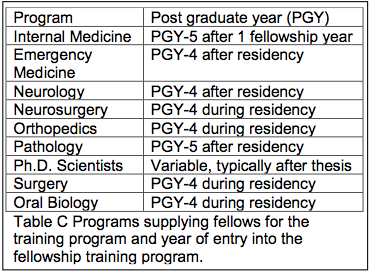Trainee Selection Criteria
Trainee Selection Criteria
Candidates for 2 year Immunobiology of Trauma Training Grant
Selection process and review criteria.
All applicants will be asked to submit the following for review by the executive committee:
- Resume including undergraduate institution and medical/graduate/dental school.
- Standardized test scores (i.e. USMLE, DSAT, GRE).
- Personal statement including
a. Specifics about the desire to develop into a clinician scientist
b. Name of mentor and lab from the faculty training list
c. Brief (half page) description of potential research project. - . Letter from Department Chair and Program Director (if appropriate) indicating that the applicant will be
able to work full time in the laboratory without any clinical responsibilities.
This information should be submitted electronically to Debra Kiley, dekiley@bu.edu
The executive committee will review these documents and select those for the second level of review. At this
time the executive committee will:
- Conduct a 30 minute interview with one of the executive committee members.
- Request two, confidential letters of reference. Letters of reference will not be requested until the second
level of review in order to decrease the number of letters which need to be prepared by faculty
members.
The executive committee will attempt to identify those candidates for training with the greatest potential to
develop into future clinician scientists. The criteria that will be used to make the selection include 1) comments
from the letter writers concerning the applicant’s interest in an academic career, 2) applicant comments during
the interview about their interest in an academic career, 3) previous experience with investigative endeavors at
any point during a post-secondary training, 4) publication record including both peer-reviewed literature, book
chapters, and abstracts, and finally, 5) other factors. Each applicant will be reviewed individually and
holistically, no point system will be assigned to any particular criteria.
All fellows accepted into the program will be required to commit to a minimum of two years of training. The time
of entry into the program will vary based on the individual applicant. Table C provides the approximate time of
entry into the training program. Internal Medicine residents would start the program after completing their
residency and 1 year of a clinical fellowship, such as pulmonary and critical care. Ph.D. scientists will typically
start at the conclusion of their graduate work, although it is recognized that many post-doctoral fellows may
wish to do a second fellowship.
 We will also attempt to recruit graduate students
We will also attempt to recruit graduate students
looking to pursue postdoctoral studies. These typically
will apply directly to an individual principal
investigator’s laboratory. Recruitment for this group of
candidates will occur by placing advertisements at
national meetings. Individual mentors will distribute
these flyers since they will be attending the
appropriate meetings and have a vested interest in
recruiting outstanding postdoctoral fellows to the
laboratory. We will also prepare a website for the
training grant which will have a list of each of the
laboratories and also a link for those labs which are
currently accepting postdoctoral fellows.
Recruiting is a critical aspect for a successful training program, and in many ways it is far more important than
selection. If there are several high-quality applicants interested in the training program, the selection process is
substantially easier, and less likely to fail since virtually any of the top candidates would be successful.